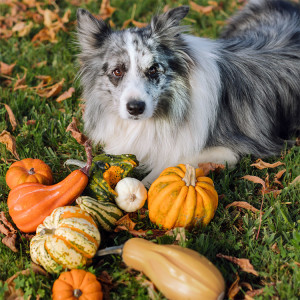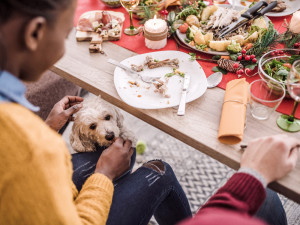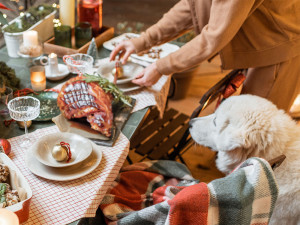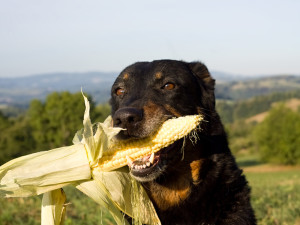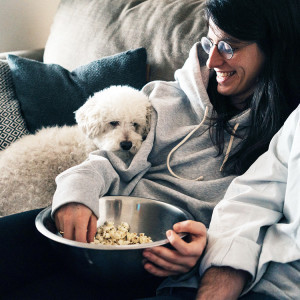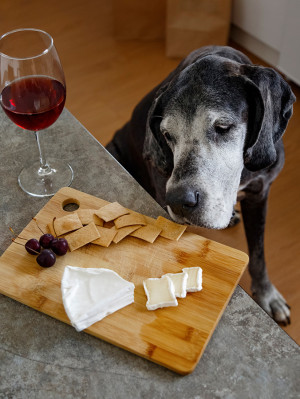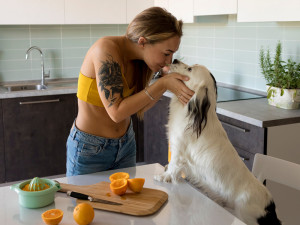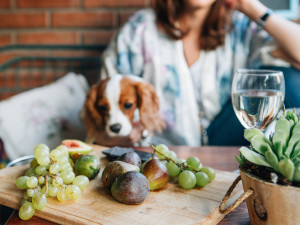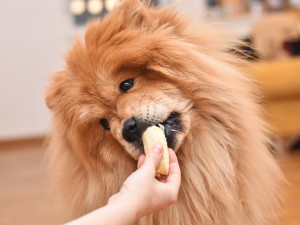Can Dogs Eat Gingerbread?
It’s the perfect festive treat for the holidays. But definitely not for your dog—learn why.
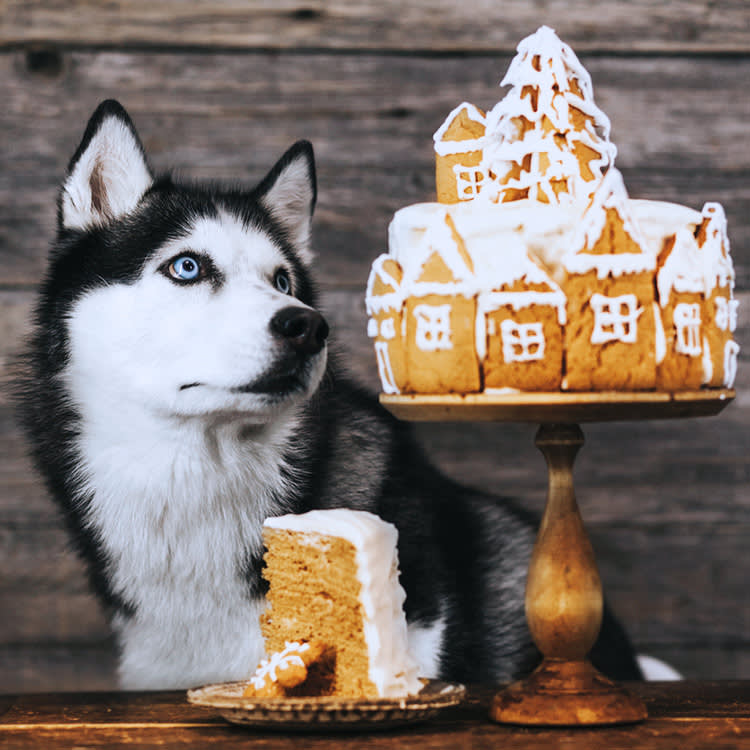
Share Article
Baking and decorating gingerbread is a sugary, time-honored tradition, but should your dog be allowed to chomp off a gingerbread man’s leg à la one of their squeaky toys? The simple answer is no; dogs should not be given gingerbread. In addition to the large amounts of sugar and fat, gingerbread often includes nutmeg, which can be toxic to dogs. For more information, we spoke to veterinarian Dr. Lindsay Butzeropens in new tab for how to keep your dogs safe this holiday season.
Nutrition facts of gingerbread for dogs
Is gingerbread good for dogs?
No, gingerbread is not good for dogs. Gingerbread contains sugar and fat, two things that aren’t toxic for dogs but are also not good for their overall health. On their own, sugary and fatty foods can cause gastrointestinal distress and pancreatitis, as well as dental issues down the road. More worryingly, in addition to sugar and fats, gingerbread contains nutmeg, which is toxic to dogs.
“Nutmeg contains a compound called myristicin, which can cause hallucinations, increased heart rate, and seizures in dogs,” Dr. Butzer tells Kinship. “It’s essential to keep nutmeg and foods containing nutmeg, like gingerbread, away from your pets.”
Can dogs have baked gingerbread?
No, gingerbread should not be given to dogs, cooked or uncooked. If you want to treat your dog to a sweet-themed treat this holiday season, consider a dog-specific advent calendar instead.
Can dogs have raw gingerbread dough?
No. “Raw gingerbread dough is a big no-no for dogs,” Dr. Butzer says. “Not only does it contain the same harmful ingredients as baked gingerbread, but raw dough can also expand in your dog’s stomach, causing severe discomfort and even life-threatening complications.”
In addition to expanding in your dog’s stomach, which can lead to obstruction and bowel issues, raw dough can ferment when eaten. That process can actually cause alcohol poisoning in dogs. If your dog does snag some dough, remain calm and be on the lookout for the following symptoms related to both or either issue:
Unproductive vomiting
Stomach distension
Weakness
Disoriented or unsteady
Depression
Hypothermia
Seizures
Coma
How much nutmeg is poisonous to dogs?
“Even small amounts of nutmeg can be toxic to dogs,” Dr. Butzer explains. “As little as one to two teaspoons of nutmeg can cause severe symptoms in a medium-sized dog.”
Play it safe, and keep dogs in a separate room while gingerbread-decorating activities are taking place, especially if said activities involve children who are more likely to drop things on the floor. If you plan to display any decorative gingerbread, be sure to do so in a place where dogs can absolutely not reach or jump.
Is gingerbread completely safe for dogs?
No amount of gingerbread is safe or healthy for your dog. However, the toxicity of gingerbread does exist on a spectrum depending on the amount your dog consumes. The more your dog consumes, the more likely the severity of any possible interactions, such as nutmeg toxicity or gastrointestinal distress.
What are some dog-safe foods you might find on your holiday table?
Carrots: Plain carrots are a healthy and nutritious snack for dogs. But because most carrots are served salted and seasoned, maybe slip your dog a plain one during meal prep.
Cooked sweet potato: Sweet potatoes are considered a “superfood” for both humans and dogs, thanks to its digestive properties. Dogs should definitely enjoy this superfood as plainly as possible and in moderation. Similar to the carrots, if you plan to season your sweet potatoes this holiday season, consider setting a plain one off to the side for your dog when cooking.
Apple: Apples are a sweet treat your dog can enjoy safely once the seeds and the core are removed. Not to sound like a broken record but moderation is also key when it comes to apples and your dog. Similarly, avoid sharing apple pie with your dog- while cooked apples aren’t toxic to pups the sugar and fat in apple pie is likely to upset your dog’s stomach.
What are other non-dog safe foods you might find on your holiday table?
Garlic and onions: Although not usually served by themselves, garlic and onions are usually involved somewhere in the process of making holiday food delicious. However, garlic and onions are toxic to your dog- particularly onions. Avoid giving your dog any foods cooked or seasoned with garlic or onions.
Grapes and raisins: Sometimes used in stuffing, raisins pose a very big risk to dogs. Even small traces of grapes or raisins can cause kidney failure in dogs. Besides stuffing, avoid serving raisins and grapes in dishes that dogs can easily reach (such as a pre-dinner charcuterie board perched on a coffee table) and do not offer dogs foods that were cooked with raisins or grapes even if the raisins and grapes have been removed.
Pecans and walnuts
Common pie fillings such as walnuts and pecans are both very toxic to dogs. Both nuts contain juglone which can cause vomiting and GI distress. Unlike raisins and grapes, one or two dropped nuts are not likely to harm your dog, though you should monitor your pup after any amount of consumption. if your dog gets into a bag of nuts or a pie, though, make sure to get veterinary attention as soon as possible.
High-fat-content foods
The holidays are a time when humans indulge in some delicious and rich dishes, but that doesn’t mean your dog should. Fatty foods, such as buttery veggies or dark meat can cause GI upset or even pancreatitis in your pup. Always make sure even ��“non-toxic” human foods are served plain without butter, seasoning, or tons of salt.
Bottom Line: Can dogs eat human food?
Most of the time, human food is not appropriate for dogs — especially foods prepared with spices and sauces like those commonly found at holiday celebrations. Gingerbread is never an OK treat for your dog, even in small quantities. In addition, gingerbread can be toxic, especially in large quantities, due to the nutmeg often present in the cookie. So if you’re looking to treat your pet to a holiday cookie, give them one that was especially created for them.
And, in the grand scheme of things, human food should never make up more than 10 percent of your dog’s diet and is best reserved for a special occasion. But if, during the holidays, you do want to treat your dog to a delicious and nutritious snack, avoid gingerbread and instead stick to plain fruits and veggies, like apples, carrots, and sweet potato.
FAQs (People also ask):
How much gingerbread can a dog eat?
Dogs shouldn’t have any gingerbread. The amount of toxicity depends on how much your pup eats, but they should never have any amount of this snack.
Is it OK to give dogs gingerbread?
It’s not OK to give dogs gingerbread. This is not an appropriate food for them, and they should have a dog-safe treat instead this holiday season.
Why do dogs like gingerbread?
Anything sweet and sugary probably seems like a treat to them. And come on: Holiday cookies smell heavenly. But they are definitely not safe for dogs.

Rebecca Caplan
Rebecca Caplan is a writer based in Brooklyn whose work has been featured in The New Yorker, Reductress, and Vulture. She lives in Brooklyn with her perfect, toothless dog Moose.
Related articles
![dog sitting by a bowl of popcorn]()
Can Dogs Eat Popcorn?
Your pup wants in on movie night.
Can Dogs Eat Shrimp?
Is your pup a seafood fan? Find out everything you need to know about feeding them shrimp.
Can Dogs Eat Cheese?
We know they want to — but how much is safe?
Can Dogs Eat Oranges and Orange Peels?
Yes, Oranges are a Nutritious Treat for Dogs
Can Dogs Eat Grapes?
The answer is no, no, no — and here’s why.
![A person giving a banana to a dog.]()
10 Fruits and Vegetables That Your Dog Can Feast On
Indulge your pup (safely) with these delicious and healthy snacks.

